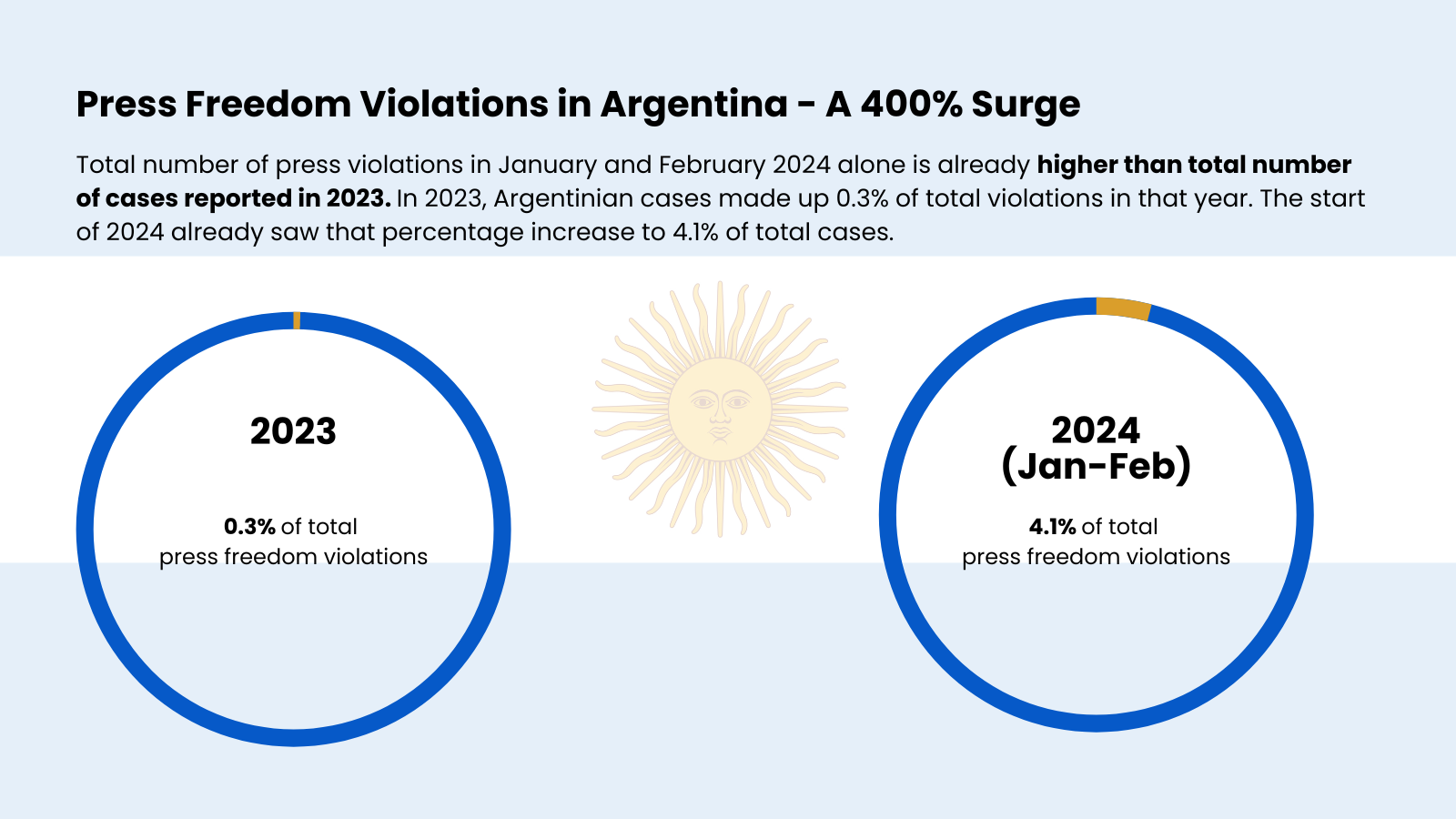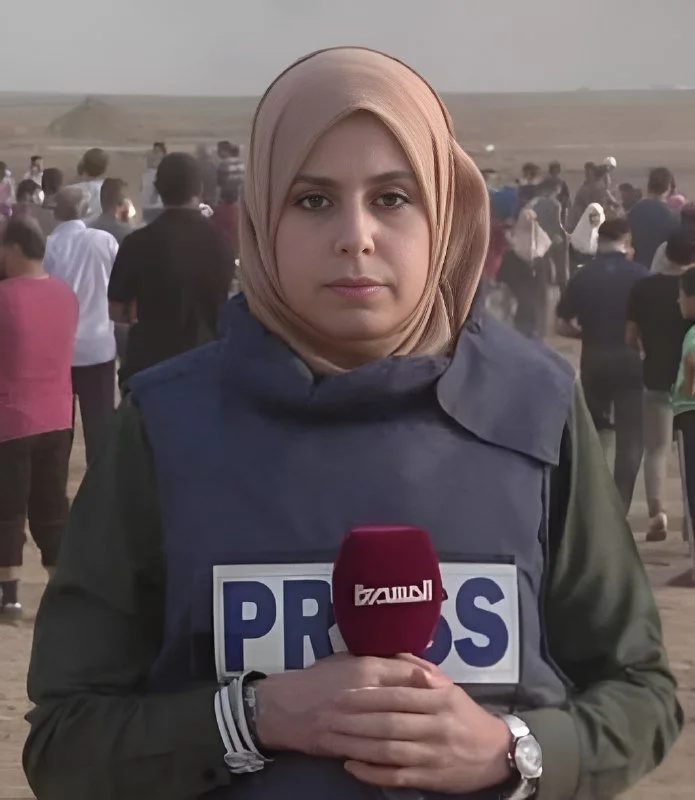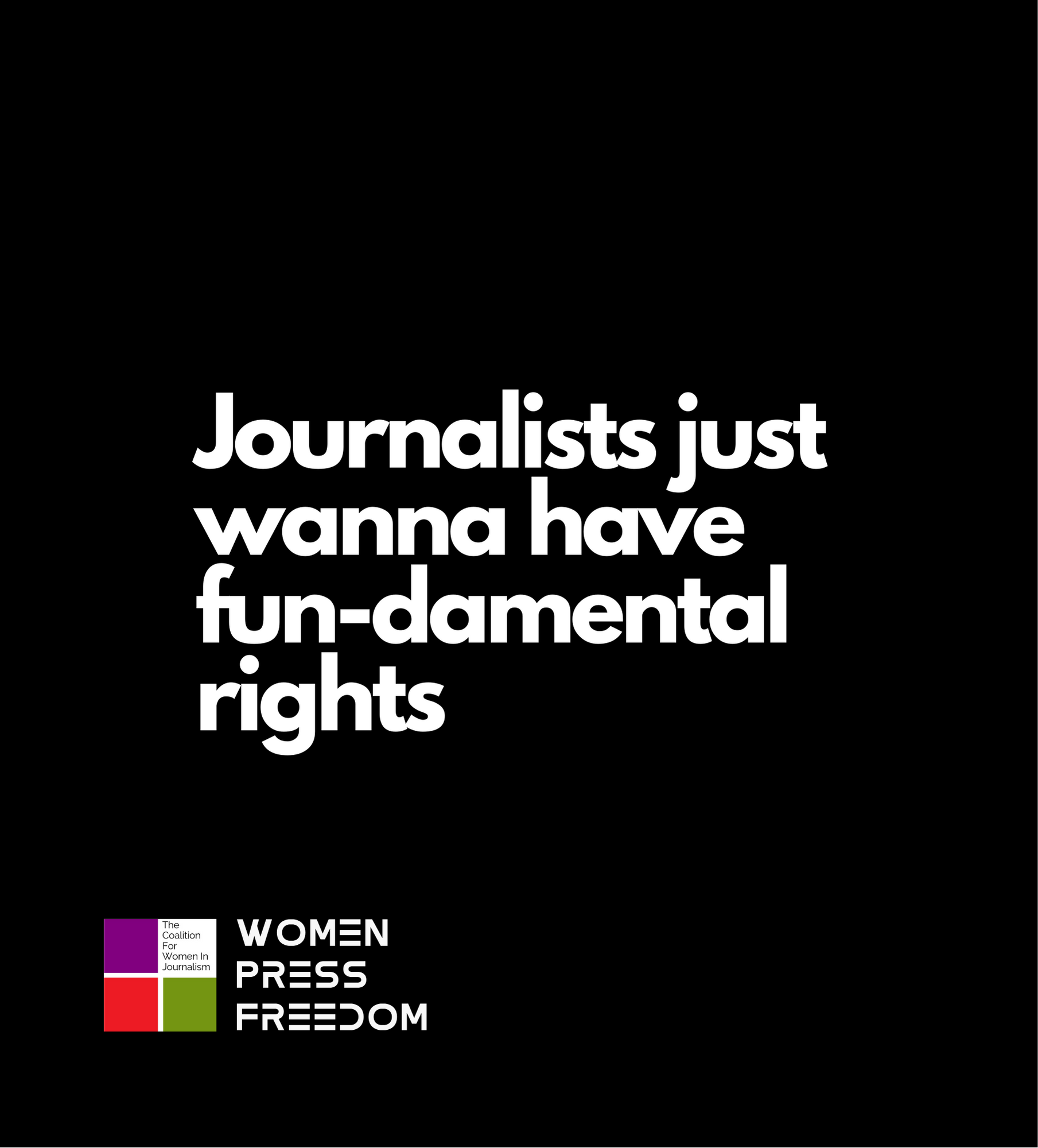Press Freedom Status for Women Journalists: February 2024
Global Increase in Detentions, With Russia and Turkey Topping the List
-
As we present the February 2024 report, we do so with a deep sense of responsibility and urgency. The findings within these pages lay bare the systemic and pervasive challenges faced by journalists across the globe. In February alone, we documented 103 violations against journalists, including 2 tragic deaths, showcasing not just the dangers of the profession but also the heightened risks women in media confront for doing their jobs.
The data presented offers a stark overview of the multitude of hazards: from legal harassment, which tops the list with 22 instances, to detentions and physical assaults, each numbering 13. These figures are not just statistics; they represent individual stories of courage, resilience, and, at times, unspeakable adversity.
The geographical spread of these violations, from Europe to the MENA region, South America to Asia, highlights a universal problem transcending borders. Yet, certain regions and countries exhibit particularly alarming trends.
Argentina emerges as a focal point, with assaults at protests contributing significantly to its high violation count. During demonstrations against far-Right President Javier Milei's proposed reform package, known as the omnibus bill, police deployed excessive force against the press. This not only resulted in the injury of over 30 journalists but also spotlighted the egregious disregard for press freedom and the physical safety of those covering events on the ground.
Russia and Turkiye, too, are highlighted for their concerning numbers. Russia upped its surge in detentions following Navalny’s death and at protests against its war in Ukraine by mothers of soldiers, while Turkiye is back to the levels of legal harassment under the guise of anti-terrorism operations, as we documented prior to the election year in 2023.
Transnational repression and the killing of Palestinian journalists Alaa Hassan Al-Hams and Angham Ahmed Adwan, underscore the dire circumstances under which many journalists operate. Similarly, the imprisonment of Nasrin Hassani in Iran for her reporting on public interest events points to the widespread issue of governments silencing dissenting voices.
This report also shines a light on online harassment, organized troll campaigns, and workplace harassment. These insidious forms of abuse have profound impacts on the mental health and professional lives of journalists, often aiming to discredit and silence their work.
As we document and disseminate these findings, it's imperative to recognize the resilience and tenacity of journalists worldwide. Despite facing daunting challenges, they continue to report, investigate, and tell the stories that need to be told.
However, acknowledging their bravery is not enough. It calls for action from governments, institutions, and society at large to ensure that women journalists can work free from harassment, intimidation, and violence. Accountability remains a critical concern, with only a handful of cases seeing any form of redress.
Inge Snip
Senior Editor, Women Press Freedom
The geographical distribution of violations reveals a complex and varied landscape across different regions. Russia emerged as a significant hotspot with 20 reported incidents, intensifying efforts in detaining journalists, especially in the wake of protests related to Navalny's death and the outcry against the war in Ukraine. Following Russia with 12 incidents, Turkey's reversion to high levels of legal harassment, especially under the guise of anti-terrorism operations, echoes its historical patterns of press suppression.
Looking ahead, we are particularly alarmed by Argentina's escalating press freedom violations. Excessive force used by police against journalists during protests against President Javier Milei's proposed reform package resulted in the injury of over 30 journalists. This hostile climate, which emerged during the election process in 2023 and intensified following Milei’s inauguration as president, signals a troubling trend that could further deteriorate if left unchecked.



Top Press Freedom Violations
In the month of February alone, Women Press Freedom documented 23 cases of legal harassment.
13 women journalists were detained, 13 were physically assaulted and 10 women journalists faced threats and/or intimidation.
Highest number of press freedom violations - by region and countries
Transnational Repression
Total number of Transnational Repression Cases
February 2024 saw a surge in transnational repression cases compared to January.
Transnational repression cases make up 12.5% of all press freedom violations in February.
Out of the 13 cases recorded, 10 were by the Russian authorities, 1 by Azerbaijan and 1 by Malaysia.
Press Freedom Violations in February 2024
In Memoriam: Two journalists killed in Gaza
CFWIJ honors the lives and legacies of media professionals whose dedication to their craft ended in their untimely deaths.
Amidst Israel's relentless assault on Gaza, two Palestinian journalists, Alaa Hassan Al-Hams and Angham Ahmed Adwan, were killed by Israel on February 12, bringing the death toll to a staggering 19 women journalists killed since October 7, 2023. Al-Hams worked for the local Sanad News Agency, while Adwan was associated with Libya's February Channel.
Alaa Hassan Al-Hams
Angham Ahmed Adwan
1 journalist imprisoned
Iran
Nasrin Hassani, a journalist residing in Bojnurd, was imprisoned on February 4 to serve a seven-month sentence. Hassani was arrested in September 2022 for reporting on events of significant public interest, including the protests ignited by the tragic death of Mahsa Amini. She was charged in September 2022 but released on bail.
3 journalists arrested
Nepal
On February 10, police in Kanchanpur district of western Sudurpaschim province arrested Aishwarya Kunwar, a reporter for the privately owned news website Nigarani Khabar, following their reporting and social media commentary on allegations of police misconduct.
Turkiye
Police conducted a dawn raid on the home of journalist Selamet Turan in Sirnak on February 9. After the search, she was detained. According to reports, the journalist was taken to the Sirnak Police Department. Three days later, a Diyarbakır court decided to arrest and jail Turan, pending a trial. The journalist was reportedly charged with “membership in a terrorist organization.”
On February 16, after four days behind bars, Melike Aydın and three other Kurdish journalists in Izmir were put under house arrest. They are under investigation for “membership of a terrorist organization.” The journalists also were issued travel bans.
13 journalists detained
Nigeria
On February 22, Kasarachi Aniagolu, a journalist with The Whistler Newspaper, was unlawfully detained by the anti-violence crime unit of the Nigerian Police Force. Aniagolu was covering a police raid on Bureau de Change operators in Abuja when she was violently apprehended.
Russia
After the death of Alexei Navalny, at least four journalists were detained on February 17 while covering spontaneous memorials to the opposition figure in cities throughout Russia. In Moscow, journalists Yulia Petrova and Zosya Rodkevich were detained while covering a rally in memory of Navalny. Security forces demanded Petrova show her documents and stopped her from recording. In Chelyabinsk, RusNews correspondent Ksenia Starikova was detained while filming a man dismantling a spontaneous memorial to Alexei Navalny. In St. Petersburg, Elina Kozich was detained while covering another memorial event. All were later released.
On February 24, 2024, RusNews journalist Yulia Petrova and SOTAvision correspondent Anna Sliva were detained at a Moscow rally of the wives of those mobilized in Russia’s war with Ukraine. Officers demanded the journalists stop filming the rally and forcefully took them away from the protests in police vans. All journalists had press cards and were wearing “PRESS” vests.
Ukraine
On February 22, 2024, armed and masked Russian occupation forces stormed the home of journalist Lutfiye Zudiyeva in Dzhankoi, occupied Crimea. The journalist was detained and released after questioning.
Senegal
On February 4, Agora TV’s Sokhna Ndack Mbacké and Itv’s Khadija Ndate Diouf were detained by gendarmerie while reporting on protests in Dakar following the postponement of elections. The journalists faced verbal abuse, confiscation of equipment, and threats of imprisonment from authorities. After a brief detention, they were released without charge.
Turkiye
In a morning raid on her home in Kocaeli on February 9, journalist Kirbriye Evren was detained by the anti-terror unit. The journalist is now facing terrorism charges for sending money to a friend in prison. She was released under judicial control (on bail).
On February 13, police raided the residences of numerous Kurdish journalists in Izmir. Authorities detained six journalists, including Semra Turan and Melike Aydın from JIN News. Days later, Melike Aydın was placed under house arrest, and Turan was released under judicial control.
6 journalists sentenced
Morocco
On February 12, the Court of First Instance in Sale imposed a one-month suspended imprisonment and a fine of 500 dirhams (approximately US$50) on journalist Hanane Bakour. She was also ordered to pay the National Rally of Independents (RNI), Morocco’s ruling party, a symbolic compensation of one dirham, the equivalent of $0.27. Bakour was convicted of “publishing fake news by using electronic means that harm private life.”
Turkiye
Several journalists and media workers, including Nazlı Ilıcak, were retried on terrorism charges related to their alleged links to the Gülen movement, which the Turkish government accuses of orchestrating the failed coup attempt in 2016. On February 14, the Istanbul 26th High Criminal Court handed down prison sentences of five years and three months to Nazlı Ilıcak.
On February 20, Neşe İdil was sentenced to 1 year and 3 months in prison by the 22nd Heavy Penal Court in Istanbul for a 2015 Twitter post related to the liberation of Kobanî, Syria, from ISIS. The execution of the sentence has been suspended for five years.
Malaysia
On February 7, British journalist Clare Rewcastle-Brown, the award-winning editor of Sarawak Report, was given a two-year sentence in absentia by the Terengganu Magistrate's Court. The journalist was convicted of defaming the queen consort Sultanah Nur Zahirah of Terengganu in her book, "The Sarawak Report - The Inside Story of the 1MDB Exposé."
Iran
A Tehran court convicted Saba Azarpeik and Kimia Fathizadeh on February 26 on charges of “spreading false information, defamation, and threats.” Azarpeik received a two-year prison sentence, with the possibility of an extension for any similar conduct and a social media ban. Fathizadeh was sentenced to six months in prison, a fine, and a two-year prohibition from engaging in journalism.
13 journalists physically assaulted
Argentina
On February 1, 2024, protests against President Javier Milei's proposed reform package, known as the omnibus bill, entered its second day. Police used excessive force to disperse protesters outside Congress, resulting in injuries to over 30 journalists, among them Celeste Alonso, Daniela María Coradeghini, Diana Quiroz, Kresta Pepe, Lorena Tapia, Paula Acunzo, Sol Arezo, and Susi Maresca.
Senegal
Maimouna Ndour Faye, a journalist and Director at the private television channel 7TV, was viciously attacked in Dakar on February 29. According to accounts from Faye’s relatives, an unknown assailant repeatedly stabbed the journalist outside her home following her television program, where she frequently engages in heated political discussions. Images circulating on social media show Faye covered in blood, clutching her stomach.
On February 9, four women journalists, Absa Hane, Fana Cissé, Isabelle Bampoky, Ngoné Diop, were assaulted by police during widespread protests throughout Senegal. The unrest followed the decision to postpone the presidential election initially scheduled for February 25, 2024.
“The press is a target. When I was shot, they had trapped the press, that’s why so many of us were shot”
10 journalists threatened or intimidated
Mexico
On February 22, President López Obrador inadvertently doxxed New York Times Bureau Chief for Mexico Natalie Kittroef’s contact information, including her phone number. The journalist had sent a letter to the president requesting comment on a U.S. investigation into allegations that people close to him received funds from drug traffickers both before and after his 2018 election. During his daily press briefing, the President displayed and read the letter aloud, showing the public Kittroef's phone number.
Colombia
Journalists for Publimetro, Eliana Peñaloza and Luz Lancheros, receive death threats after criticizing influencer Westcol for animal cruelty. Westcol attacked Peñaloza’s appearance and discredited her work leading to a barrage of hateful messages and threats from his followers. When Lancheros tried to defend her colleague, she too, became a target and was threatened.
On February 9, 2024, multiple journalists, including RCN’s Angie Alquichides, were attacked by a group of protesters in Bogotá. During their attempt to report on the upheaval, the journalist from RCN, along with her cameraman, found themselves in a threatening scenario when a man demanded to know their affiliation with the media organization. The situation quickly escalated as more people joined, shouting, "Get out of here," and attempting to harm them physically.
Azerbaijan
Azerbaijan journalists continue to face harassment and intimidation from authorities while living in Georgia. Reports from several journalists indicate a disturbing pattern of attacks and surveillance by what they believe to be Azerbaijani security services. Despite seeking refuge in Georgia, these journalists, including Aytan Farhadova, continue their work of reporting on and speaking out against the regime.
Germany
On February 15, verbal abuse and insults were directed at Bloomberg reporter Petra Sorge and reporters from several outlets as they sought to report on Vice Chancellor Robert Habeck's visit to a chocolate factory in Seligenthal.
Kenya
On February 3, journalist Namukabo Werungah for The New Humanitarian shared a dangerous encounter she and her reporting team faced while on location. Without mentioning the specific area where the attack occurred, the journalist said she and her crew had a lucky escape when an armed group surrounded them.
Kosovo
Balkan Investigative Reporting Network (BIRN)’s Adelina Ahmeit and a camera operator were intimidated while interviewing a local resident in Klina e Eperme. They were reporting on a proposal to build a Catholic church in the area on February 26 when they were confronted and insulted.
Montenegro
On February 22, Tamara Vučinović was reported to the police by the principal of an educational institution in the city of Tivat. The complaint was filed after Vučinović refused to disclose her source of information for an article on the school.
Russia
On February 9, 2024, several journalists in Moscow, including DER SPIEGEL’s Christina Hebel, were visited by security authorities and intimidated, apparently in response to their coverage of an upcoming protest by wives, mothers, and sisters demanding the return of their family members from the Ukraine war. Police officers warned media workers not to attend the protest. Some journalists received calls and requests to report to the police station, while others faced direct threats of house raids and criminal proceedings.
23 journalists legally harassed
Russia
The Interior Ministry issues arrest warrants for numerous women and non-binary journalists including Maria Chistyakova, Veronika Belotserkovskaya, Marina Ovsyannikova, Alla Gutnikova, Maria Menshiko, Natalia Tyshkevich, Anna Narinskaya, Yevgenia Baltatarov, Maria Efrosinina, Nataliia Moseichuk and Svetlana Anokhina. The list, which was revealed on February 13, includes Russian and Ukrainian journalists. All the Russian journalists listed live in exile.
Brazil
On February 14, a Bahia State court rejected journalist Alana Rocha's appeal against her criminal conviction. The journalist served eight months in open detention after being sentenced for defamation for reporting on Rádio Gazeta FM in 2021.
Pakistan
On February 1, news anchor Ashfaque Ishaque Satti served news anchor Rabia Anum with a defamation notice in response to her reporting on domestic violence. Anum, a prominent journalist with a substantial social media following, shared the plight of Satti’s wife, Nomaika, on Twitter on January 29. Nomaika accuses her husband of abuse.
Ukraine
On February 23, Lutfiye Zudiyeva was slapped with charges of "misuse of freedom of mass media" for her Facebook posts. These posts included content from Radio Free Europe/Radio Liberty (RFE/RL), labeled an "undesirable" organization by Russia, and references to the banned Islamic group Hizb ut-Tahrir. Zudiyeva faces fines of up to 100,000 rubles ($1,050) if convicted.
Thailand
On February 6, a decade after being acquitted of defamation charges linked to her reporting on human trafficking, Chutima Sidasathian is yet again on trial for criminal defamation — this time for her 2021 exposé on a corrupt lending scheme involving state officials. Defamation is a criminal offense in Thailand, and Sidasathian faces years behind bars if convicted.
Egypt
On February 20, Mada Masr’s editor Lina Attalah was subjected to questioning by prosecutors for nearly two hours and is now facing charges of "publishing false news without checking its sources" and "running a website without a license." Following the interrogation, she was released on bail.
India
Jashoda Desai was charged with defamation on February 6. The journalist who works for Prathna Sandesh News, is facing slander accusations for uploading content on social media that questions the educational qualification of a local politician of the ruling Bharatiya Janata Party (BJP).
Turkiye
Çiğdem Toker revealed on February 1 that she was summoned by Ankara Chief Public Prosecutor’s Office for her comments made on Fox TV during a program following a presidential election runoff in May 2023.
On February 16, after four days behind bars in Izmir, Kurdish journalist Semra Turan was released under judicial control. She and five of her colleagues are under investigation for alleged membership of a terror group. Turan was issued a travel ban and must sign in at a police station twice a week
Nagihan Yılkın, a reporter for Cumhuriyet, was convicted for "insulting a public official” on February 16. The outlet's Editor-in-Chief, Mustafa Büyüksipahi, was acquitted of the same charge. The Istanbul 2nd Criminal Court fined Yılkın approximately €200 for the offense.
On February 16, 2024, Istanbul prosecutor Mehmet Said Küçükbursa announced he was seeking severe penalties for ETHA editor Nadiye Gürbüz on charges of affiliation with a terrorist group and promoting its ideology. The prosecutor advocated for a disproportionately harsh sentence ranging from 9 to 22.5 years of imprisonment.
At a hearing at the Istanbul 2nd Criminal Court of First Instance on February 22, the prosecutor demanded the punishment of columnist Gözde Bedeloğlu for the alleged crime of "insulting a public official due to their duty."
United States
On February 29, a federal judge held journalist Catherine Herridge in contempt of court. The ruling stems from Herridge's refusal to reveal her confidential sources for a series of investigative reports published in 2017 during her tenure at Fox News. The journalist plans to appeal.
5 journalists harassed online
Australia
Anti-Zionist activists in Australia have published the names, images, professions, and social media accounts of hundreds of Jewish people working in academia and creative industries in an escalation of social tensions over the October 7 attacks and subsequent war in Gaza. The dissemination of almost 600 names and their personal details was taken from the purported membership of a private WhatsApp Group formed last year by Jewish writers, artists, musicians, and academics.
Zimbabwe
On February 19, journalist Rutendo Maraire filed a police report against controversial businessman Wicknell Chivayo whom she accuses of cyberbullying and sexual harassment, after the reporter quizzed him about expensive vehicles he had generously lavished on musicians.
“The experience has taken a toll on my enthusiasm and positivity for reporting to the extent that I am contemplating a shift to another field”
Germany
Alexandra Föderl-Schmid, the Deputy Editor-in-Chief of Süddeutsche Zeitung, was targeted with an aggressive, defamatory campaign spearheaded by the right-wing populist platform "Nius." This campaign has included accusations of plagiarism tied to her Ph.D. dissertation, with "Nius" commissioning "plagiarism hunter" Stefan Weber to scrutinize her work. These allegations, which primarily focused on the 30-year-old dissertation from the University of Salzburg, further inflamed the online harassment campaign.
Slovakia
Following being targeted in a smear campaign by politicians, journalist Zuzana Kovačič Hanzelová is doxxed and harassed online by conspiracy theorist Daniel Bombic on February 15. Bombic launched degrading online attacks against Hanzelová, including vile edited photos of the journalist.
France
On February 1, the United Nations Special Rapporteur on Human Rights defenders, Mary Lawlor, voiced profound concern regarding the continuous harassment faced by French Muslim journalist Rokhaya Diallo. This harassment, spanning over several years, encompasses various forms of intimidation and obstruction, emblematic of the challenges journalists, particularly women of color, encounter in advocating for human rights and freedom of expression.
2 journalists targeted by organized troll campaigns
United States
Digital activism turned harassment targets American podcast host, content creator, and comedian Elyse Myers. "Operation Watermelon" has emerged as a controversial campaign on social media platforms like TikTok, where pro-Palestinian supporters aim to hijack comment sections of popular influencers to amplify the Palestinian cause. However, the campaign's latest target, Myers, has spotlighted the ethical boundaries of such digital movements.
Pakistan
On February 1, an organized online harassment campaign targeted journalist Gharida Farooqi after she found herself tagged in abusive tweets with slanderous hashtags. Women Press Freedom investigation reveals that this is a deliberate and organized effort to silence the journalist. It marks the most extensive instance of organized digital violence we have ever recorded in the region against a journalist after Rana Ayyub.
A journalist's accreditation revoked
United States
On February 23, Amanda Moore was unjustly targeted and barred from reporting on the CPAC convention, even though she had a valid ticket and her press credentials had been approved initially. The sudden revocation of Moore's credentials followed by her removal from the conference on the grounds of being on a red-flag list, sets a troubling precedent for press freedom. This act of censorship is especially concerning given the unrestricted access of extremist people to CPAC, in stark contrast to the deliberate exclusion of a journalist renowned for her coverage of neo-Nazis and far-right movements.
A journalist surveilled
Canada
On February 1, alarming revelations emerged regarding the possible secretive surveillance of journalist Brandi Morin by Welund, a multinational intelligence firm with active contracts with the Alberta government.
8 journalists harassed in the workplace
The Netherlands
In a revealing investigation on February 27 by the Dutch newspaper AD, over eight women journalists have come forward with allegations of systematic bullying, discrimination, and a pervasive culture of fear at WNL, a prominent broadcaster within the Dutch public broadcasting system NPO. The allegations have brought to light significant issues within the organization, challenging the public's perception of the media landscape in The Netherlands.
A journalist sexually harassed
Brazil
On February 27, sports reporter Gisele Kumpel filed a complaint against a mascot for sexual harassment, accusing the club icon of pushing her head and motioning to kiss her. The incident was alleged to have taken place during a football match, when Gisele Kumpel claims the home team's mascot constantly made gestures towards her. The journalist is pressing charges.
4 journalists discredited
Germany
On February 26, during demonstrations in Dresden, fake AI-generated audio clips from the Tagesschau news program were played. These recordings contained false apologies purportedly from Tagesschau presenters, including Susanne Daubner, for alleged "lies” and "deliberate manipulations" in their reports for the ARD broadcasting network. The deepfakes were played at a Wilsdruffer Street demonstration, where thousands gathered for so-called Monday Demonstrations to protest government policies.
Kosovo
Journalist Saranda Ramaj and media outlets KOHA and Kohavision faced attacks and attempts to discredit their work after reporting on a property exchange involving the Municipality of Pristina and its mayor.
Slovakia
Starting on February 11, high-ranking politicians from the Direction – Social Democracy (Smer) party launched a coordinated smear campaign against journalist Zuzana Kovačič Hanzelová. The campaign was led by Deputy Speaker of the Parliament and Vice Chair of Smer, Ľuboš Blaha, who used his Telegram channel to launch a series of scathing attacks.
Venezuela
On February 2, Hilianni Vásquez faced attacks and insults from local government officials in Cumaná after covering a protest by residents in Terrazas del Sol.
11 journalists denied access
Azerbaijan
During the February 7 elections, multiple journalists, including Ulviyya Ali and Lida Abbasli, were obstructed and prevented from filming at polling stations.
Guinea-Bissau
The presidential communication advisor prohibited journalists Fátima Tchuma Camará and Indira Correia Baldé from reporting on events at the nation's presidential palace on February 8. The targeting occurred following the president's alarming attacks against the media.
Spain
The government of the Region of Murcia continues to refuse to issue press accreditation to freelance journalist Rosa Roda. Despite multiple formal and informal attempts, oral and written, Roda received vague and discouraging responses from the government's press office.
Venezuela
Officials from the Scientific, Criminal, and Criminal Investigation Corps (CICPC) in Porlamar, in the state of Nueva Esparta, enforced restrictions that impeded reporters from ten media outlets from capturing visual documentation, including photographs and videos, at approximately 50 meters from the police headquarters during a riot that unfolded within the institution on February 15. At least five women journalists were impeded.
Israel/Egypt
In an open letter on February 28, addressed to the governments of Israel and Egypt, over 50 British and American journalists expressed the necessity of on-the-ground reporting for foreign media in Gaza to provide accurate and comprehensive coverage of the conflict. The journalists are urging the Israeli government to openly declare permission for the international press to operate in Gaza and implore Egyptian authorities to facilitate foreign press access through the Rafah crossing.
Major Layoffs of Journalists Continue in Canada and the United States
In a significant shake-up within Canada's media landscape on February 8, Bell Media — the country’s largest media and telecom company — has announced the cessation of multiple television newscasts and the sale of a substantial portion of its regional radio stations, amounting to approximately 4,800 job cuts across the organization. While specific layoff figures for Bell Media were not disclosed, it is estimated that ten percent of the total job losses are within the media subsidiary.
February also saw the continuation of troubling media layoffs in the United States with significant staff cuts at outlets NowThis and The Intercept. By the end of January, the media industry accumulated losses of over 980 jobs. Sources tell Women Press Freedom that NowThis dismissed an astonishing 50% of its staff, 19 of whom are women. The Intercept reduced its staff by one-third. Among the impacted are Jasmine Amjad, Luria Freeman, Shayna Posses, Emily Sullivan Barger, Aryana Azari from NowThis and Rashmee Kumar, Elise Swain, Alice Speri, Skyler Aikerson, Andrea Jones, Morgan DeMartis and Schuyler Mitchell from The Intercept
Accountability








If you would like to request more insight into our findings, or would like to suggest an addition to our work reach out to us at info@womeninjournalism.org. For media inquiries reach out to us at press@womeninjournalism.org.Women Press Freedom is an initiative by The Coalition For Women In Journalism
The Coalition For Women In Journalism is a global organization of support for women journalists. The CFWIJ pioneered mentorship for mid-career women journalists across several countries around the world and is the first organization to focus on the status of free press for women journalists. We thoroughly document cases of any form of abuse against women in any part of the globe. Our system of individuals and organizations brings together the experience and mentorship necessary to help female career journalists navigate the industry. Our goal is to help develop a strong mechanism where women journalists can work safely and thrive.










